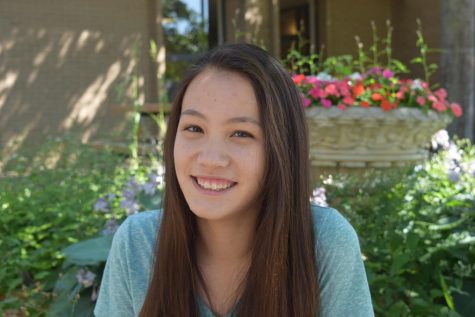Club helps girls build confidence in STEM
Photo by Photo used with permission of Anagha Rajagopalan.
Anagha Rajagopalan, president/founder of Girls Who Code with sponsors Julie Bryniczka, Ann Heltzel, and Karen Landen.
Women hold less than a quarter of STEM jobs, even though they hold 50 percent of all jobs in the American economy. The continually-widening gender gap in engineering fields was one junior’s inspiration for starting a computer science club for girls.
Anagha Rajagopalan, junior president of Girls Who Code, founded the club this year for girls interested in learning coding at their own pace.
“There is a large gender gap in the workplace especially in STEM fields and majors, and that has only been increasing in the past years,” Rajagopalan said. “I think a lot of it has to do with exposure of computer science to women because women are underrepresented in STEM fields, especially computer science, stemming from a long culture of gender bias. It’s difficult for women to both enter the field as well as get ahead. This club was created to help close this gap and help women explore what they’re interested in.”
Girls Who Code is a national organization that sends plans for each meeting. One of its main keys is to build a bond within the club and learn to appreciate other girls, according to Rajagopalan. During meetings, the club will also watch a spotlight videos on a woman in tech who had done something to change her community, then get to the coding.
“There are all sorts of different topics [and programming languages] like web design, games, scratch, HTML (Hypertext Markup Language), there are so many different things you can learn how to code for,” Rajagopalan said. “People can explore all of the tutorials and lessons, and can take time to teach it to themselves, learn with a friend, or take time to do it outside of school if they can’t make a meeting. It’s all at their own pace; people never have to be at a certain point.”
Girls Who Code gives sample curriculum lessons for them to learn, and according to Ann Heltzel, co-sponsor, it is more than just teaching code, it puts the members of the club into a network of coding girls across the United States and the world.
“It is very supportive to be in an all girl environment. They are less intimidated, can make friends, are unafraid of making mistakes, and can look at things in ways that boys do not typically look at them,” Heltzel said. “Coding is touching virtually every career there could possibly be, so this club is very beneficial for girls to learn new knowledge that will help them later in life as well.”
Girls have more than proven themselves equal to boys in the classroom, but are sometimes discouraged from taking STEM classes like boys, who typically dominate the field. The club’s goal is to encourage women to try and get into these fields, such engineering and computer science, Rajagopalan said.
“I’m really excited to learn how to code and explore to see if it’s for me, and open this opportunity for other girls who have never had the chance”. Rajagopalan said. “I’m also really excited to get to know all the people who will be involved in the club. It’s a great place to make friends with intelligent women that share similar interests and goals.”
Girls Who Code will meet 2nd and 4th Mondays after school in A114, sponsored by Ann Heltzel, Julie Bryniczka, and Karen Landen.

Valerie is a sophomore and Sports Editor of Bear Facts Student Media. She is involved in cross country, track and field, theater, sophomore class board,...

